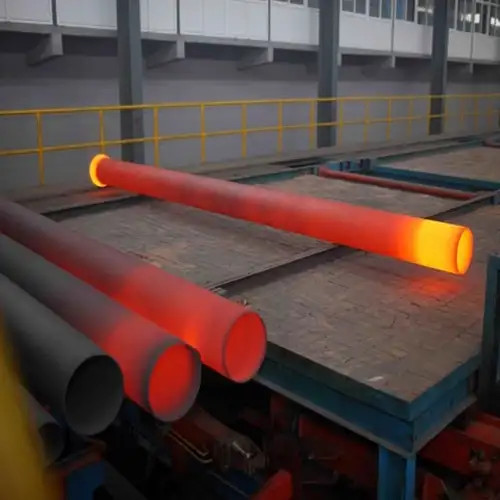The American Water Works Association (AWWA) C151 standard specifies the requirements for ductile iron pipes used in potable water, raw water, wastewater, and reclaimed water systems. These pipes are centrifugally cast and are designed to meet the rigorous demands of modern water infrastructure.
Ductile iron pipes are favored for their strength, durability, and resistance to corrosion, making them suitable for various applications, including municipal water distribution and industrial systems.

1. Standard Sizes and Dimensions
AWWA C151 ductile iron pipes are available in nominal sizes ranging from 3 inches to 64 inches (76 mm to 1,600 mm). The external diameter remains consistent across different wall thicknesses to ensure compatibility with joints and fittings.
| Nominal Size (inches) | External Diameter (inches) |
|---|---|
| 3 | 3.96 |
| 4 | 4.80 |
| 6 | 6.90 |
| 8 | 9.05 |
| 10 | 11.10 |
| 12 | 13.20 |
| 14 | 15.30 |
| 16 | 17.40 |
| 18 | 19.50 |
| 20 | 21.60 |
| 24 | 25.80 |
| 30 | 32.00 |
| 36 | 38.00 |
| 42 | 44.00 |
| 48 | 50.00 |
| 54 | 56.00 |
| 60 | 62.00 |
| 64 | 66.00 |
These dimensions are standardized to ensure uniformity and compatibility across different manufacturers and installations.
2. Pressure Classes and Thickness Design
Ductile iron pipes under AWWA C151 are classified based on their pressure rating and wall thickness. The pressure classes range from 150 psi to 350 psi, indicating the maximum internal pressure the pipe can withstand.
| Pressure Class (psi) | Wall Thickness (inches) |
|---|---|
| 150 | 0.25 |
| 200 | 0.31 |
| 250 | 0.38 |
| 300 | 0.44 |
| 350 | 0.50 |
The wall thickness is designed to accommodate internal pressures and external loads, ensuring the pipe’s structural integrity under various conditions.
3. Coatings and Corrosion Protection
To enhance the longevity of ductile iron pipes, various coatings are applied to protect against corrosion. The most common coatings include:
-
Cement-Mortar Lining: Provides a smooth interior surface and protects against internal corrosion.
-
Asphaltic Coating: Applied to the exterior to prevent corrosion from soil and environmental factors.
-
Polyethylene Encasement: Offers additional protection in aggressive soil conditions.
These coatings are essential for extending the service life of the pipes, especially in challenging environmental conditions.
4. Pricing Analysis and Cost Factors
The cost of AWWA C151 ductile iron pipes varies based on several factors:
-
Nominal Size: Larger diameter pipes require more material and are thus more expensive.
-
Pressure Class: Higher pressure ratings necessitate thicker walls, increasing material costs.
-
Coatings: Additional coatings add to the manufacturing cost.
-
Quantity: Bulk purchases often result in cost savings.
For instance, a 4-inch ductile iron pipe may cost around $22.71 per foot, while a 48-inch pipe could be priced at approximately $342.26 per foot.
5. Manufacturers and Suppliers
Several reputable manufacturers produce AWWA C151 ductile iron pipes, including:
-
American Cast Iron Pipe Company: Known for its high-quality products and adherence to industry standards.
-
India: Offers a wide range of sizes and pressure classes to meet various project requirements.
-
LuoKaiWei: Provides innovative solutions and extensive customer support.
These manufacturers ensure compliance with AWWA standards and offer products suitable for diverse applications.
6. Installation Guidelines
Proper installation is crucial for the performance and longevity of ductile iron pipes. Key considerations include:
-
Trench Preparation: Ensure a stable and uniform bedding to support the pipe.
-
Joint Assembly: Follow manufacturer guidelines for joint installation to prevent leaks.
-
Backfilling: Use suitable materials and techniques to avoid damage during backfilling.
Adhering to these guidelines helps in maintaining the integrity of the pipeline system.
7. Maintenance and Longevity
Ductile iron pipes are designed for durability, but regular maintenance is essential:
-
Inspection: Conduct periodic inspections to identify potential issues.
-
Cleaning: Remove debris and sediment that could affect flow capacity.
-
Repairs: Address any damage promptly to prevent further deterioration.
With proper maintenance, ductile iron pipes can have a service life exceeding 100 years.
8. Frequently Asked Questions (FAQs)
Q1: What is the difference between AWWA C151 and AWWA C150 standards?
AWWA C151 specifies the requirements for the manufacturing of ductile iron pipes, while AWWA C150 provides guidelines for the design and thickness of these pipes based on internal pressure and external load conditions.
Q2: Can AWWA C151 pipes be used for both potable and non-potable water systems?
Yes, AWWA C151 pipes are suitable for various applications, including potable water, raw water, wastewater, and reclaimed water systems, provided they are appropriately coated and lined.
Q3: How do pressure classes affect the cost of ductile iron pipes?
Higher pressure classes require thicker walls to withstand increased internal pressures, leading to higher material costs and, consequently, higher prices for the pipes.
Q4: Are there environmentally friendly coating options for ductile iron pipes?
Yes, some manufacturers offer eco-friendly coatings that reduce environmental impact while providing adequate corrosion protection.
Q5: What factors should be considered when selecting a manufacturer for ductile iron pipes?
Considerations include compliance with AWWA standards, product quality, range of sizes and pressure classes, customer support, and warranty offerings.
Q6: How does the installation environment affect the choice of ductile iron pipe coatings?
Aggressive soil conditions may require additional protective coatings, such as polyethylene encasement, to prevent corrosion and extend the pipe’s service life.
